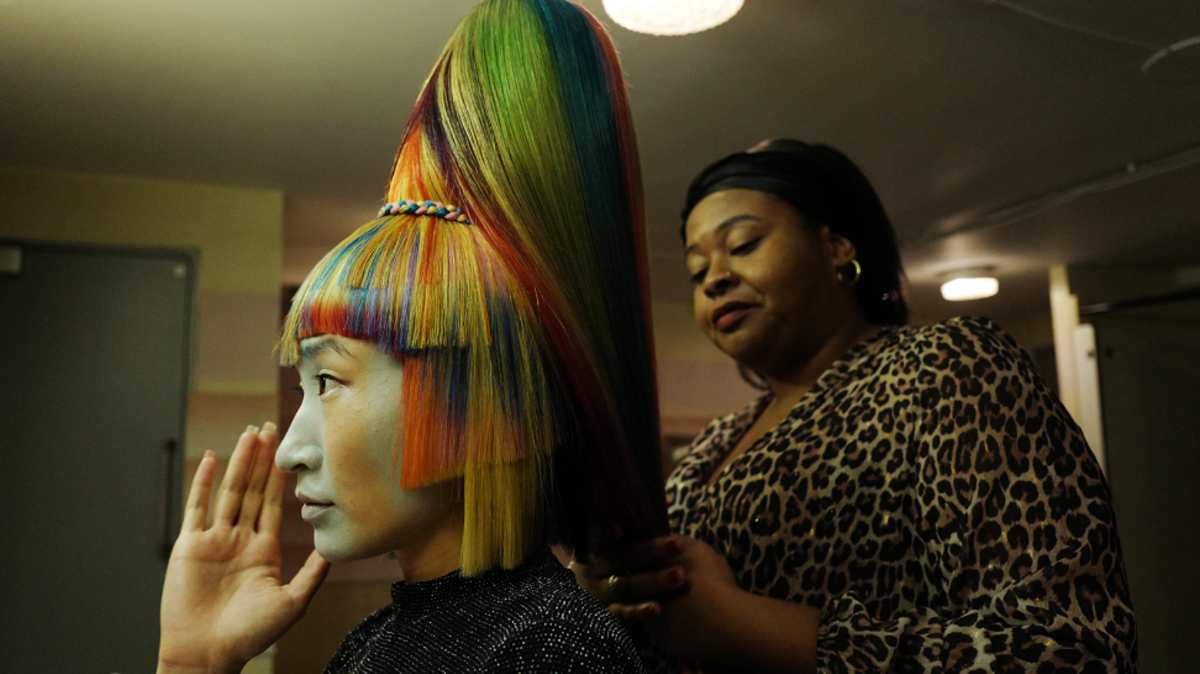In a symphony of cinematic aspirations, a vivid tapestry weaves across the screen, a testament to the visionary prowess of cinematographer extraordinaire, Robbie Ryan. Known for his towering collaborations with luminaries like Andrea Arnold and Yorgos Lanthimos, Ryan’s formidable genius finally embraces the realm of unbroken narrative with “Medusa Deluxe.” The film, an intricate dance of continuous motion, owes its kinetic allure to the artful finesse of editor Fouad Gaber, who adeptly melds the bobbing and weaving Steadicam sequences into a seamless symphony. Yet, despite this spirited display reminiscent of “Birdman’s” elastic artifice, it is an elegant facade that only partially conceals the chinks in Hardiman’s script. Amidst a whirlwind of vibrant characters, more vivid than shaded, the narrative inevitably loses its way, stumbling upon the rocks of its own creative constraints.
Originating from the pen of Hardiman himself, the narrative embarks on a robust journey. It’s Cleve, the incisive stylist whose sharp words rival her precision with the scissors, who unfurls the tale’s commencement. Undoubtedly, the spotlight belongs to Perkins in this tale. Infusing her character’s irascibility with a delightful twist of humor, she remains steadfast, a guardian of Cleve’s intentions, motivations, and alliances – a pillar of strength within the constellation of “Medusa Deluxe’s” personalities.
Yet, let it be known that the realm of stylists is far from monochrome. A series of remarkable performances rescues the narrative from the perils of its own potential wanderings. The ensemble breathes life into the eccentric, disconcerting universe of beauticians who etch their craft in almost sacred terms. In a transformative interlude, Angie (embodied by Lilit Lesser), the very model upon whom Cleve practices her art, beckons us to a respite. The camera lingers on the half-completed metallic structure adorning Angie’s crown as she traverses the backstage realm. A tale unfolds – of Timba (portrayed by Anita-Joy Uwajeh), who narrates her chance encounter with a lifeless form. “I contemplated a scream, yet silence prevailed,” Timba utters, a cocoon of metallic orange enveloping her form.
The camera’s gaze snakes through the room, capturing rapt expressions as Timba’s narrative unfolds. Even in their unfinished states, the models’ hair (sculpted by Scarlett O’Connell) gestures towards the artisans’ exacting prowess and dedication. Yet, as “Medusa Deluxe” draws near its culmination, a peculiar sense of deflation settles in. The pervasive wandering and exploration acquire an air of diversion. Questions emerge – who are these individuals, and where does their trajectory lead? Hardiman’s characters, once bold strokes of narrative, seem to fray at the edges, their grievances echoing in redundant loops. A yearning for a more liberated narrative arises, one unencumbered by its formal experimentation.
Nonetheless, as the tale’s tableau unfurls, as characters’ motivations – both overt and veiled – emerge, Hardiman vindicates himself. The narrative boasts artful transitions and sleek exchanges, fostering engagement and trust, fostering anticipation for the unknown. Within “Medusa Deluxe,” we witness a director chiseling his own opulent Georgian fontange.
“Medusa Deluxe” unabashedly embraces stereotypes as grandiose and expansive as the ornate coiffures it lovingly spotlights – a nod of appreciation is due to chief hairstylist and Wella creative director Eugene Souleiman, whose editorial creations inject a breath of high-fashion into this frugal enterprise. Nevertheless, time etches weariness into the amalgamation of caustic, shellacked personas and the deliberately entangled narrative. A longing for simplicity lingers.
Amidst this, redemption arrives through the film’s artistic exuberance. Ryan’s camera gracefully glides through the pandemonium, dancing through vibrant, fluorescent hues, akin to discarded garments, all harmonizing with the sparse, pulsating melodies of British electro artist Koreless. Just when the precipice of eccentricity beckons, Hardiman’s hand deftly intervenes, transitioning into a euphoric, disco-drenched epilogue. A departure from the film’s preceding mesh of influences, encompassing shades of Almodóvar, Altman, Sally Potter, and a pinch of British teatime TV. The question of deserving such a flourish remains elusive, for within the realm of “Medusa Deluxe’s” myriad mirrors, every soul is the protagonist of their melodrama, and thus, deserving of stylistic grandeur.











